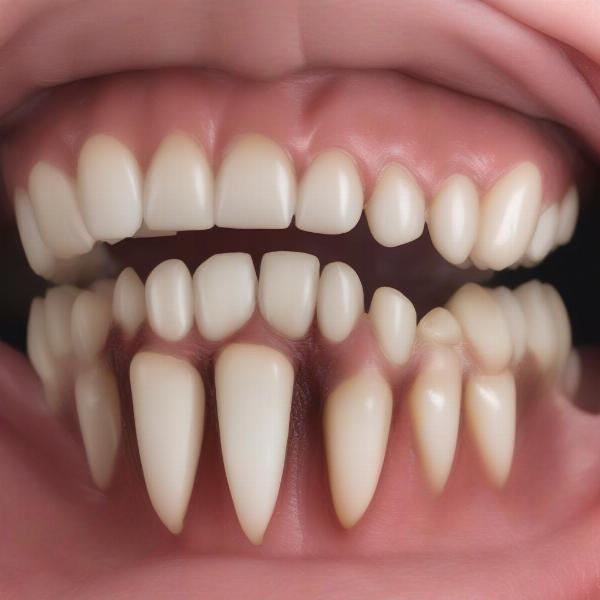Gum health is a critical aspect of a dog’s overall well-being. Understanding the importance of healthy gums, recognizing signs of trouble, and knowing how to maintain your dog’s oral hygiene can significantly impact their quality of life. This guide will explore everything you need to know about gum and dogs, from common dental issues to preventative measures and treatment options.
Recognizing Healthy Gums in Dogs
Healthy gums in dogs are typically pink and firm. They should fit snugly around the teeth and shouldn’t bleed easily. Just like in humans, healthy gums are a vital indicator of overall health in our canine companions. Changes in gum color, texture, or the presence of bad breath can be warning signs of underlying dental problems.
Common Gum Problems in Dogs
Gingivitis, periodontal disease, and gum tumors are among the most common gum problems affecting dogs. Gingivitis, characterized by inflamed gums, is often the first stage of periodontal disease. If left untreated, it can progress to a more severe infection affecting the tissues supporting the teeth. Regular dental checkups and cleaning are crucial to preventing and managing these conditions.
 Gum Disease in Dogs
Gum Disease in Dogs
Gingivitis and Periodontal Disease: Signs and Symptoms
Recognizing the early signs of gingivitis and periodontal disease is essential for timely intervention. These include bad breath, red or swollen gums, bleeding gums, difficulty chewing, and excessive drooling. If you observe any of these symptoms, consult your veterinarian for a thorough dental examination. gum disease in dogs photos offer a visual guide to identifying these issues.
Maintaining Your Dog’s Gum Health
Maintaining your dog’s gum health is a lifelong commitment that involves regular brushing, dental chews, and professional cleanings. Brushing your dog’s teeth daily with a dog-specific toothpaste is the most effective way to remove plaque and prevent tartar buildup. Dental chews, like whimzees dog chews, can help reduce plaque and tartar and provide a healthy chewing outlet.
Choosing the Right Dental Products
Selecting the right dental products for your dog can make a significant difference in their oral health. Avoid using human toothpaste, as it contains ingredients that can be harmful to dogs. Opt for dog-specific toothpaste and toothbrushes designed for their unique needs. Consider tooth wipes for dogs as a convenient alternative for dogs who resist brushing.
The Importance of Professional Dental Cleanings
While at-home dental care is crucial, professional dental cleanings by a veterinarian are essential for maintaining optimal gum health. These cleanings involve removing plaque and tartar buildup under anesthesia and addressing any existing dental issues. Regular professional cleanings are crucial for preventing periodontal disease and maintaining your dog’s overall health. gum for dogs can provide further information about professional dental care.
Are there any natural remedies for dog gum problems?
While natural remedies may offer some relief for mild gum irritation, they are not a substitute for professional veterinary care. Always consult your vet before trying any home remedies. Additionally, be mindful of other health conditions your dog might have, such as liver fluke in dogs, which may require specific dietary restrictions.
Conclusion
Maintaining your dog’s gum health is a crucial part of responsible pet ownership. By understanding the importance of healthy gums, recognizing signs of potential problems, and implementing preventative measures, you can help your furry friend enjoy a long and healthy life. Regular at-home care, combined with professional veterinary checkups, is the best approach to ensuring your dog’s optimal oral health and overall well-being.
FAQ
- How often should I brush my dog’s teeth? Ideally, you should brush your dog’s teeth daily.
- What are the signs of gum disease in dogs? Bad breath, red or swollen gums, bleeding gums, difficulty chewing, and excessive drooling are common signs.
- Can I use human toothpaste on my dog? No, human toothpaste contains ingredients that are harmful to dogs. Use dog-specific toothpaste.
- How often should my dog have professional dental cleanings? This depends on your dog’s individual needs, but typically, annual cleanings are recommended.
- What are some good dental chews for dogs? Look for dental chews specifically designed to promote oral health and reduce plaque and tartar.
- Are there any home remedies for dog gum problems? While some natural remedies may soothe mild irritation, consult your vet before trying them.
- How can I make teeth brushing easier for my dog? Start slowly, use positive reinforcement, and choose a dog-specific toothbrush and toothpaste.
About ILM Dog: ILM Dog is your trusted resource for expert advice on dog care and wellbeing. We offer comprehensive information on breed selection, health, training, nutrition, grooming, and much more. From puppy care to senior dog needs, we cover all aspects of responsible dog ownership. Contact us today to learn more about our services and resources. Email: [email protected], Phone: +44 20-3965-8624.